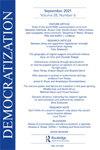恢复无声选举:捷克的民主、无争议选举和公民参与
IF 2.9
1区 社会学
Q1 POLITICAL SCIENCE
引用次数: 0
摘要
本文章由计算机程序翻译,如有差异,请以英文原文为准。
The return of silent elections: democracy, uncontested elections and citizen participation in Czechia
ABSTRACT Even when robust competition becomes institutionalized for national elections in democracies, this is no guarantee that elections to subnational governments will be equally competitive there. This article documents a recent disconcerting worldwide return of “silent elections'' - electoral races in which citizens are unable to choose among political alternatives and their vote makes no difference to the outcome. Holding such uncontested elections clashes simultaneously with the dual dimensions of democratic government: contestation and inclusiveness. Eliminating any contestation whatsoever not only skews democratic representation but is also expected to have a devastating effect on citizen participation. Leveraging a large dataset of 6,254 Czech municipalities in seven municipal elections between 1998 and 2022, the main contributions of this article are assessing the extent of the problem of silent elections over time, understanding its root causes, estimating its effect on turnout and exploring what mechanisms drive the nexus between uncontested elections and voter participation. The steady rise in the proportion of uncontested races (28% of all municipalities by 2022) as well as their staggering and increasing estimated effect on turnout (17 points relative to contested) point towards a thus far unnoticed deficit of local democracy.
求助全文
通过发布文献求助,成功后即可免费获取论文全文。
去求助
来源期刊

Democratization
POLITICAL SCIENCE-
CiteScore
6.40
自引率
12.50%
发文量
73
期刊介绍:
Democratization aims to promote a better understanding of democratization - defined as the way democratic norms, institutions and practices evolve and are disseminated both within and across national and cultural boundaries. While the focus is on democratization viewed as a process, the journal also builds on the enduring interest in democracy itself and its analysis. The emphasis is contemporary and the approach comparative, with the publication of scholarly contributions about those areas where democratization is currently attracting considerable attention world-wide.
 求助内容:
求助内容: 应助结果提醒方式:
应助结果提醒方式:


